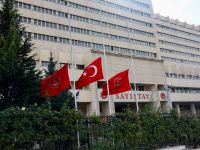Deloitte: Middle East Organizations Need To Rethink Their Workforce in the Wake of COVID-19

Organizations in the Middle East have had to take immediate actions in reaction to the COVID-19 pandemic, such as shifting to remote and virtual work, implementing new ways of working and redirecting the workforce on critical activities. According to Deloitte’s 10th annual 2020 Middle East Human Capital Trends report, “The social enterprise at work: Paradox as a path forward,” organizations now need to think about how to sustain these actions by embedding them into their organizational culture.
“COVID-19 has created a clarifying moment for work and the workforce. Organizations that expand their focus on worker well-being, from programs adjacent to work to designing well-being into the work itself, will help their workers not only feel their best but perform at their best. Doing so will strengthen the tie between well-being and organizational outcomes, drive meaningful work, and foster a greater sense of belonging overall,” said Ghassan Turqieh, Consulting Partner, Human Capital, Deloitte Middle East.
According to the Deloitte report, many organizations in the Middle East made quick arrangements to engage with employees in the wake of the pandemic through frequent communications, multiple webinars where senior leaders addressed employee concerns, virtual employee events, manager check-ins, periodic calls and other targeted interactions with the workforce.
The report also discussed how UAE and KSA governments have reexamined work policies and practices, amended regulations and introduced COVID-19 initiatives to support companies and the workforce in the public and private sectors. Flexible and remote working, team-building and engagement activities, well-ness programs, recognition awards and modern workspaces are among the many things that are now adding to the employee experience.
Key findings from the Deloitte global report include:
·Only 17% of respondents are making significant investments in reskilling to support their AI strategy with only 12% using AI primarily to replace workers;
·27% of respondents have clear policies and practices to manage the ethical challenges resulting from the future of work despite 85% of respondents saying the future of work raises ethical challenges;
·Three-quarters of leaders are expecting to source new skills and capabilities through reskilling, but only 45% are rewarding workers for the development of new skills; and
·Only 45% of respondents are prepared or very prepared to take advantage of the alternative workforce to access key capabilities despite gig workers being likely to comprise 43% of the U.S. workforce this year according to the Bureau of Labor Statistics.
“Worker well-being is a top priority today, and similarly to the rest of the world, companies in the Middle East are focusing their efforts to redesign work around well-being by understanding workforce well-being needs,” said Rania Abu Shukur, Director, Human Capital, Consulting, Deloitte Middle East.
Background Information
Deloitte
We believe that we’re only as good as the good we do.
All the facts and figures that talk to our size and diversity and years of history, as notable and important as they may be, are secondary to the truest measure of Deloitte: the impact we make in the world.







